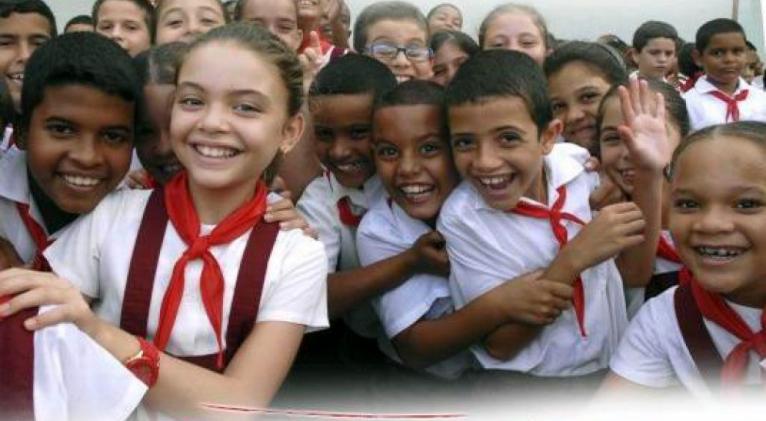Cuba: Humans with Rights

The smile of children, the joy of the young, the peacefulness of the elders, the participation in the economic and social life of the country of women and men, are a mirror of the citizen peace of a nation that builds its future every day.
Human rights in Cuba - broadly reflected in the new and modern Constitution of the Republic - are a tangible reality, criticized, and harassed by the enemies of the Revolution, who attempt to minimize the achievements of a process that placed human beings at the center of its public policies.
Those who dare to deny it don’t know the true essence of this social project which, since its beginnings, took into account and move forward along blue collars, workers, farmers, and students.
Health for Everyone
Cuba shows health indicators parallel to those of developed countries, displaying encouraging results in this sector. Among them could be mentioned the full coverage of healthcare, through the Family Doctor and Nurse Program; a life expectancy of 78.45 years (80.45 for women), and a population aging of 20.3%, as a result of the work carried out during all these years.
Without forgetting the huge healthcare infrastructure created by the Revolution throughout the island (150 hospitals, 449 polyclinics, 111 stomatological clinics and 12 institutes). It must be highlighted the progress made regarding the training of human resources: 57.4% of health workers are professionals, and there are 8.5 doctors per thousand inhabitants.
Even when the enemies of the Revolution insist on discrediting them, Cuban doctors have the love and admiration of millions of people worldwide. In the picture, a group of them on their return home, after Cuba decided not to continue participating in the More Doctors program in Brazil. We don’t offer what we have to spare, but we share what we have.
At first glance, statistics are overwhelming. However, there are rights - perhaps not fully valued – like for example, that in this small country the children of farmers can be trained as doctors; Hospital care is equally for everyone, regardless of each person's economic situation, and surgical interventions - difficult as they may be – they are performed for free.
On the other hand, the State invests substantial resources for the development and acquisition of technologies for the biotechnology and pharmaceutical industries, in order to find drugs against cancer and other diseases that endanger people's lives.
Another fact is that of 761 products included in the basic table of medicines, 273 are imported, and 488 are produced by the national industry. The blockade against Cuba imposed by the United States for almost 60 years heavily impacts the production of such drugs.
Education without exclusion
Our education is also an achievement and a paradigm for many regions of the planet. Commander in Chief Fidel Castro Ruz, historical leader of the Revolution, envisioned since the beginning that without literacy for the people it would be impossible to carry out the plans that would guarantee the development of the country.
Following this premise, the Literacy Campaign was developed in 1961, and in the 1970’s, the follow-up plans were introduced, with the famous struggles (at that time) to reach sixth and ninth grades.
Since then, Cuba has become a great school, giving high priority to this area. Each September, more than 10,000 educational institutions of general education open their doors to receive more than a million schoolchildren, since early childhood to college as well as technical and professional schools. They have guaranteed the minimal key resources to begin their studies.
A teacher for one, two, three students. They are called multigrade teachers, because they teach several grades lessons. The one in the photo, for example, lives in a remote place from Artemisa, between mountains, by a river, where he has his little school so that no Cuban child is left without learning to read and write. Are we talking about human rights? Here’s a good example!
Besides the successes attained abroad, based on solidarity and educational literacy agreements, the country has been developing for some years now the Third Improvement Process, in order to keep and raise quality, objective of highest priority for this field.
Likewise, at the beginning of each academic year, universities (50), all public, welcome thousands of students, just on the basis of their intellectual skills. This may seem like a dream for many countries in the region.
On top of that, on the path to universalize education, 122 Municipal University Centers are currently operating, which means that in every last corner of the national territory there are Higher Education centers, where professionals are trained, according to the characteristics and needs of each place.
A relevant fact is that today 50% of scientists in Cuba are women, and they are the 67% of their qualified technical force.
Devotion to full dignity
Many other aspects related to human rights in our country must be mentioned. The list would be endless because the Revolution was made to build a dignify man, woman, and achieve - as our Golden Law reads – Jose Marti´s deep desire, finally attained: “I want the First law of our Republic to be the cult of the Cubans to the full dignity of man.”
This December 10th - when commemorating Human Rights Day - I preferred to arrange the words differently to approach it to our context, hence highlighting that in Cuba we have humans rights, the first of them, to life, to education, to health, to work. The essence was bequeathed by Fidel for posterity in his concept of Revolution: "It’s to be treated and treat others as human beings."













Add new comment